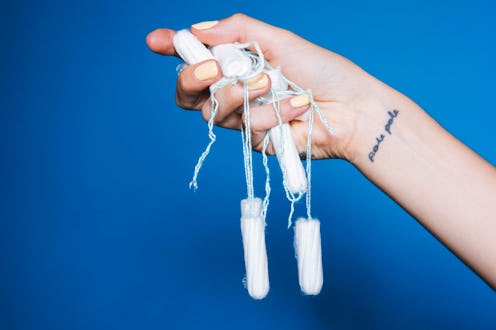Life
Here's How Your Period Is Different When You're On Hormonal Birth Control

Under the category of “things that women have to deal with but don’t love,” periods would probably make the top 10. For some people, a period involves painful cramps, mood swings, migraines, acne, and more — making it the not-so-great "time of the month".
“With the onset of menstruation at an average age of 12.3 years, most women will experience periods for a significant portion of their lives,” Prudence Hall, M.D., gynecologist and founder and medical director of The Hall Center, tells Bustle. “It’s important to know as much as you can about this much maligned and misunderstood, yet natural and healthy, body function.” And when you add hormonal birth control to the mix, it’ll affect your period, too.
Periods are different when you’re on hormonal birth control. Of course, several forms of contraception fall under this umbrella, from the birth control pill to certain types of intrauterine devices (IUDs), such the Mirena.
“The period, or menstruation, is regulated by hormones that are secreted by the ovary,” Julie Rios, MD, reproductive endocrinologist at the UC Center for Reproductive Health, tells Bustle. “Different forms of birth control can contain different hormones and, thus, affect women’s periods in various ways.” But some birth control methods can affect periods more than others.
“Period changes are best controlled by the birth control pill, a progesterone-containing IUD, the Depo-Provera shot, and Nexplanon, a contraceptive implant,” Dr. Sherry A. Ross, women’s health expert and author of she-ology. The Definitive Guide to Women’s Intimate Health. Period., tells Bustle. Of course, only you and your doctor or OB/GYN can determine which method of birth control is best for you, if any. However, if you’re curious as to how common types of hormonal birth control can affect your periods, here's what experts have to say.
1The Pill
The pill works by stopping ovulation, so there is no egg for sperm to fertilize. For the pill to be most effective, more than 99 percent, you should take it at the same time every day. While some types of birth control pills contain estrogen and progestin, others are progestin-only.
And birth control pills can affect your period in various ways. “Oral contraception — or ‘the Pill’ — is the perfect period regulator,” Dr. Ross says. “It can make your period predictable, lighter, or nonexistent and controls cramping, PMS, and acne — and is the only contraception that improves acne, in fact.”
In addition, Dr. Ross says that some women take the pill continuously in order to skip having a period altogether. “When you do not take the last seven-to-four placebo or inactive pills, and only take the active ones, you can actually stop yourself from having a period each month,” she says. She says that, for many women, there are medical reasons to stop your period from happening each month, including those suffering from debilitating menstrual cramps, premenstrual syndrome (PMS), hormonal migraines, irregular periods, anemia, pain associated with endometriosis, or if someone is high-risk for ovarian cancer.
2Hormonal IUDs
“The progesterone containing IUDs — Mirena, Kyleena, and Skyla — were designed to give you a lighter or non-existent period,” Dr. Ross says. “The Mirena and Kyleena IUD often give you no period, which is a welcomed side effect for many women, and both of these IUDs are used to treat women with irregular and heavy periods.”
While you may prefer an IUD without hormones, aka the Copper IUD, it may cause heavy and irregular bleeding or debilitating cramps, Dr. Ross says.
3Depo-Provera Shot
Another long-acting progesterone birth control is Depo-Provera, which is given by injection every 12 weeks. “Depo-Provera can help with menstrual cramps and PMS,” Dr. Ross says. “However, potential side effects include irregular periods or no periods at all, acne, depression, and headaches.”
4Nexplanon Implant
Dr. Ross says that if you’re looking for a long-lasting birth control method, Nexplanon, which is made of the hormone progesterone, is an option. “It’s an arm implant which lasts for three years, and the other wonderful benefit with Nexplanon is that it makes your period light or non-existent without having to ingest a pill every day.”
As you can see, the above forms of hormonal birth control impact your period in various ways, and you and your health care practitioner can decide what works best for you. While the birth control methods above can protect against pregnancy, they do not protect against STIs, so make sure to use condoms in that case.
This article was originally published on